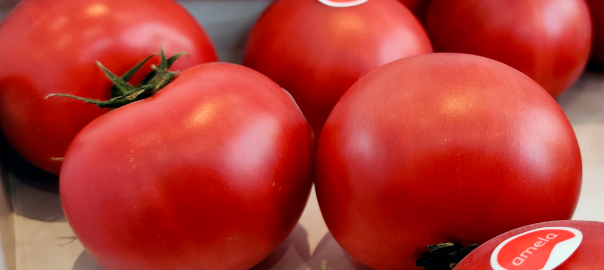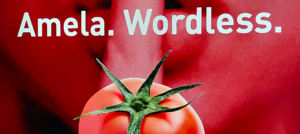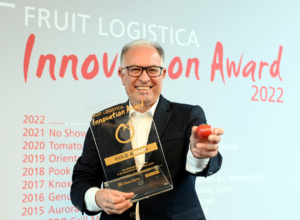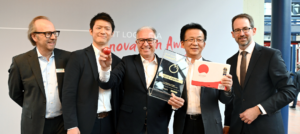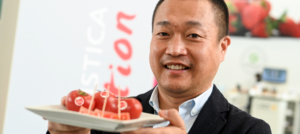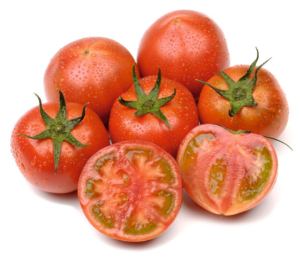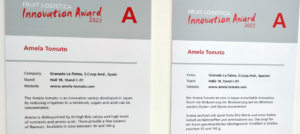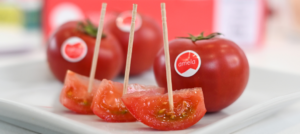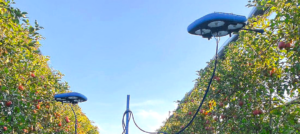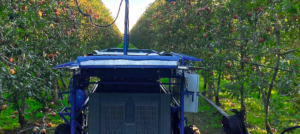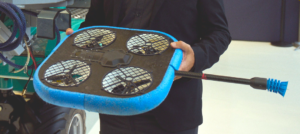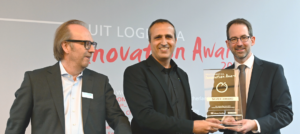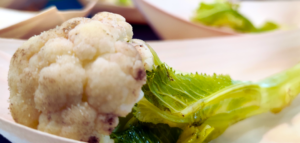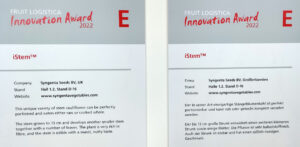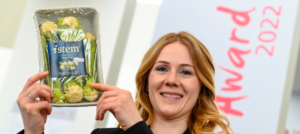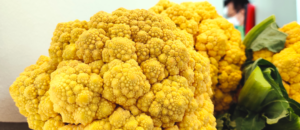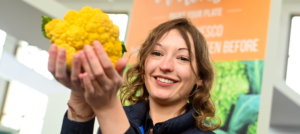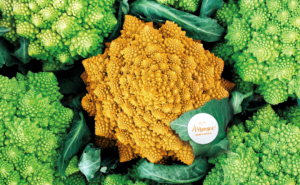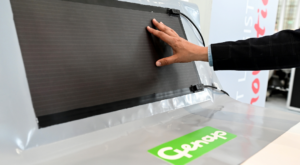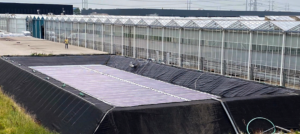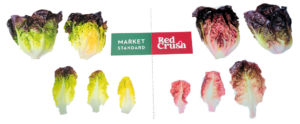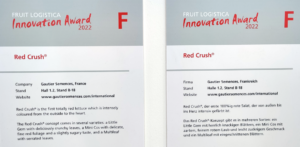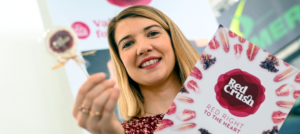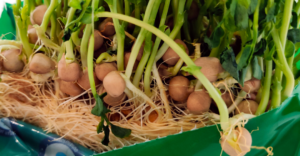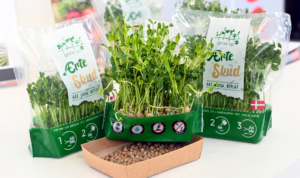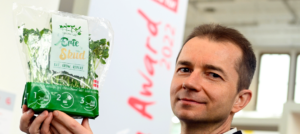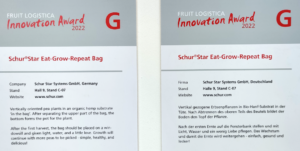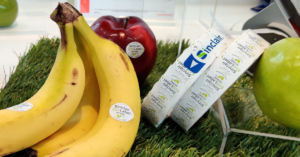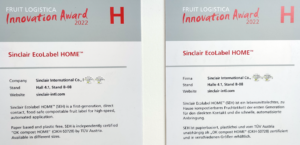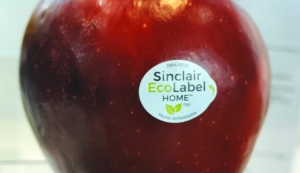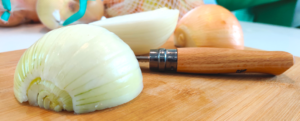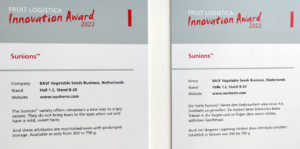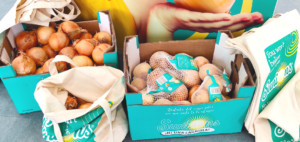This year, the Innovation Award at FRUIT LOGISTICA was once again a real magnet for visitors. However, the setup for the presentation of the Innovation Award participants was different this time from that of previous years.
Messe Berlin had decided to set up the associated stands in Hall 20. This was a wise decision, especially due to the always poor acoustics and proximity to the trade fair catering at the previous location in front of Hall 21, because now visitors could devote themselves to the innovators’ presentations in a much more relaxed manner.
We begin our brief overview of this year’s participants, including a profile, with the winner of the FRUIT LOGISTICA 2022 Innovation Award.
With the Intense (winner in 2008), a flesh tomato and the YOOM (winner in 2020), two tomatoes from the Netherlands had already achieved success. This time, the tomato came from Spain and originated from a Japanese/Spanish cooperation.
“Amela® Tomato”, Granada La Palma, S.Coop.And., Spain
At the outset, we naturally offer our hearty congratulations to this cross-continental collaboration for winning 1st place in this year’s Innovation Award.
The focus of the producers of the Amela® tomato was on the one hand, how could it be otherwise, on the taste, but on the other hand also on sustainability through water-saving.
The Amela® tomato requires significantly less irrigation than the tomatoes of its competitors, which is a real competitive advantage in this day and age and also makes a positive difference in terms of taste.
The Amela® tomato originated in 1996 in Japan, more precisely in the region around the city of Shizuoka. This is also where the name Amela® comes from, which can be translated as sweet in the local dialect. The cultivation technology causes that this variety is characterized by a high Brix degree (around 9 °Bx | degrees Brix, source: Wikipedia) and thus tastes significantly sweeter than tomatoes in general.
Due to the reduction of the water content, the sugar and acid components are more prominent in taste, which, in addition to the pleasant umami taste, leads to an almost fruit-like taste perception. In addition to the sweetness, the tomato naturally also has vitamins A, B and C as well as some potassium, iron and many other important trace elements to offer, which are necessary for a healthy diet.
The Amela® tomato should ideally be stored at room temperature and also be consumed with such, only in this way it is ensured that the entire taste range of this vegetable can also be grasped. A selection of what you can “do” with this great tomato can be found on the recipes page of the producer.
Since 1996, this tomato has been a real triumph and is now one of the most popular tomato varieties, not only in Japan. So, it came that the Amela® found its way to Europe, more precisely to Spain, because as everyone knows, even there nothing goes culinary without proper tomatoes on the plate.
So, it came to a cooperation of the Japanese with the Spanish farmer cooperative Granada La Palma SCA, which exists for nearly 50 years now. The Amela® is now also grown in the south of Granada according to traditional Japanese techniques and is thus available fresh from the field, so to speak, for the European market. We hope you enjoy tasting it (www.amela-tomato.com).
Flying Autonomous Robots (FARs)™ Tevel Advanced Technologies Ltd, Israel
The Israeli company Tevel is bringing artificial intelligence to fields and cultivation areas with its futuristic fruit and vegetable picking devices. In the near future, units with several drone-like picking robots will make their way through apple, pomegranate or orange plantations. The units can be requested by growers at short notice and then undergo a brief calibration on site before they begin their work.
Not least due to the pandemic, one challenge was to be able to implement the harvest more independently of the availability of seasonal workers. It is often so hot on the plantations that it was difficult to deploy pickers throughout the day.
Moreover, in addition to accounting aspects such as the required visas, round-trip flights, accommodations must also be built and maintained – all of which is not necessarily climate neutral, which was an additional driving force behind the development of Tevel.
Depending on requirements, the robots are equipped with grippers or suction attachments and then autonomously pick the respective fruit or vegetable and transport it to the associated base stations, and do so 24/7 if necessary. In doing so, the robots can classify the degree of ripeness of the picked fruit and thus fruits that still need some time to ripen remain untouched. (Editor`s note: Here, in combination with TOMRA`s sensor technology, an additional milestone could certainly be reached).
The approach does not end with picking, of course, but includes a holistic approach. Thus, the picking plants can be stringently monitored via a management interface and at the same time calculations of the collected quantities and many other parameters that are important for the respective operation can be provided. Tevel won the 2nd place of the Innovation Award this year (www.tevel-tech.com).
iStem™ Syngenta Seeds BV, Netherlands
Cauliflower is not only popular in Germany – as a substitute for the classic Schnitzel, the so-called cauliflower Schnitzel celebrates repeated successes, and not only among vegetarians. Syngenta Seeds from the Netherlands has now set itself the challenge of making even more sustainable use of this popular cabbage.
When using the cauliflower stalks, which can be up to 13 cm long, there should be virtually no more “wastage” in the garbage can. The new stemmed cauliflower, which is easy to portion, can be eaten raw as well as cooked, steamed or grilled – and this in its entirety. The leaves of the fibre-rich cauliflower can also be eaten. The stem cauliflower has a sweet, nutty taste and should be prepared al dente (al dente, source: Wikipedia), because it tastes best when crunchy.
At FRUIT LOGISTICA 2020, the company had already won first place in the Innovation Award with the YOOM tomato – this time the Dutch took 3rd place (www.syngentavegetables.com). You can also find a short clip about the Innovation Award Bronze winner on YouTube: https://youtu.be/knCgogTvVIg.
Amoresco® HM.CLAUSE SAS, France
Most of us know it – Romanesco cauliflower – a very special cabbage, which is not least a visual treat. The constantly repeating coils remind us of the Mandelbrot set (Mandelbrot set, source: Wikipedia) when we find it on our plates.
With the Amoresco®, since the beginning of 2021 (introduction in Italy), the Romanesco cauliflower from HM.Clause is now available fresh through the winter also in orange – significantly richer in beta-carotene, it retains its bright colour even after cooking and thus ensures colourful plates and sufficient vitamins even in the cold season.
During the rest of the year, Amoresco® is of course also available, but then from the freezer – which thus makes the product available all year round and does not detract from its enjoyment.
We recommend to prepare this Romanesco always al dente (al dente, source: Wikipedia), so it stays crunchy and can already show off in the mouth with its unique texture.
We hope you enjoy tasting it (www.hmclause.com).
Genap Energy Cover Genap B.V., Netherlands
The Dutch company Genap is an expert in foil constructions and their application in horticulture, agriculture and civil engineering projects.
Another of Genap’s specialties is floating cover foils, for example for biogas plants, irrigation ponds and slurry ponds.
For the FRUIT LOGISTICA Innovation Award, the company entered the Genap Energy Cover. This is a floating cover for irrigation basins that can also generate environmentally friendly energy via integrated solar panels.
We think this is a successful innovation – it is exactly the kind of approach that is needed to meet the energy challenges of our time. One technology alone will not be sufficient for the future, here it is the mixture that counts – because only a variety of different solutions will bring us closer to the goal of energy independence (www.genap.nl).
Red Crush® Gautier Semences, France
The company Gautier Semences from France presented three variations of its Red Crush® at the Innovation Award. The Red Crush®, which is available in three different variations, is the first salad that is almost 100% red right to the heart.
First, there is the “little gem”, which is suitable for both outdoor and hydroponic cultivation. This is a lettuce with an upright growth and a dense, intense red heart with a very crunchy texture – an all-rounder, so to speak.
The second variation is the “mini cos”, which is ideal for outdoor cultivation in temperate conditions. The leaves are smooth, very tender and have a slightly sweet taste.
The third variation is called “multi-leaf” – this is a lettuce that is suitable for spring and autumn harvest, outdoors as well as hydroponically. This variety has curly, red, incised leaves with intense red colouring and, in addition to being used for salads, is also excellent for decorating buffets (www.gautiersemences.com).
Schur®Star Eat-Grow-Repeat Bag, Schur Star Systems GmbH, Germany
This year’s innovation from Schur Star Systems GmbH is a packaging that is also a plant container for vertically grown pea plants. By means of an organic hemp substrate at the bottom of the packaging, consumers are able to grow freshly harvested organic vegetables on their own windowsill. All that is needed is light, water and a little love, according to Schur.
As soon as one has separated the upper part of the packing the soil forms the pot of the plant. After the first harvest, a second stage can then be “ignited” and nothing stands in the way of a further harvest if cared for properly.
In times where consumers grow their own mushrooms, seedlings and vegetables – whether in the kitchen, in the city garden or on the roof – a small but fine innovation in the direction of sustainability (www.schur.com).
Sinclair EcoLabel HOME™, Sinclair International Co., Great Britain
Sinclair International Co. of the United Kingdom has taken on the challenge of product labelling. To compete for the Innovation Award, the company has entered the Sinclair EcoLabel HOME™ – a T50-certified compostable household label. The label is paper-based, plastic-free and has been certified by TÜV Austria (OKH-S0728).
Sinclair EcoLabel HOME™ labels are suitable for both manual and automated labelling. They can be disposed of in-home compost and will degrade into usable compost material within 365 days (depending on location, temperature and other factors), with no negative impact on the environment from the adhesive, face material or inks (www.sinclair-intl.com).
Sunions™ – BASF Vegetable Seeds Business, Netherlands
With the Sunions™, BASF Vegetable Seeds Business from the Netherlands offers consumers something that many generations have already wished for – the onion without tears. The Sunions™ onion has a fine, mild and sweet taste and literally leaves “every eye dry”.
So, in the future, there will no longer be a tear in the way of home cooking classes with the offspring. What seemed impossible before can now be accomplished, and not only children’s eyes are grateful.
The Sunions™ also have advantages in terms of sustainability and resource conservation. All those contemporaries who always use water for support in order to avoid tearful onion cutting can now do without it – a real plus.
We think this is a great innovation – now the Sunions™ just has to prove itself in everyday culinary life, let’s see (www.nunhems.com).
